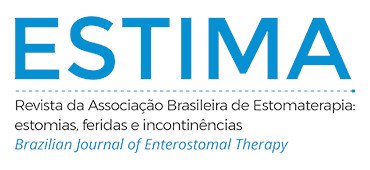Prevalence of incontinence-associated dermatitis and associated factors in intensive care patients
Abstract
Objective: To determine the prevalence of incontinence-associated dermatitis (IAD) and factors associated with its occurrence in adult patients admitted to intensive care units (ICUs). Method: This is an observational, epidemiological, cross-sectional, point-prevalence study conducted in ICUs with a sample of 40 patients. The
following statistical tests were applied: Fisher’s exact test, Student’s t-test, Mann-Whitney test, and logistic regression. Results: The prevalence of IAD was found to be 22.5%. After univariate and bivariate analysis of associated factors, logistic regression was performed on variables with a p-value less than 0.20. Only the variable
“sedated patient” was found to be statistically significant, which means that a sedated patient is 5.4-fold more likely to develop IAD compared to the population without IAD. Conclusion: The prevalence of IAD found in this study may assist in the planning of healthcare resources, interventions, and prevention strategies, as well as help institutions compare IAD indicators in similar populations. In addition, the finding that sedated ICU patients were 5.4-fold more likely to develop IAD may be useful in developing targeted prevention strategies for this population.
DESCRIPTORS: Prevalence. Intensive care units. Enterostomal therapy. Diaper rash.
Downloads
Metrics
References
Smart H, Sibbald RG. Skin care for the protection and treatment of incontinence associated dermatitis (Iad) to minimise susceptibility for pressure injury (PI) development. WCET® Journal 2020;40(4):40-4. https://doi.org/10.33235/wcet.40.4.40-44
Werth SL, Justice R. Prevalence of moisture-associated skin damage in an acute care setting: outcomes from a quality improvement project. J Wound, Ostomy Continence Nurs. 2019;46(1):51-4. https://doi.org/10.1097/WON.0000000000000499
Beeckman D, Van Lancker A, Van Hecke A, Verhaeghe S. A systematic review and meta-analysis of incontinence-associated dermatitis, incontinence, and moisture as risk factors for pressure ulcer development. Res Nurs Health. 2014;37(3):204-18. https://doi.org/10.1002/nur.21593
Portugal LBA, Christovam BP. Estimativa do custo do tratamento da lesão por pressão, como prevenir e economizar recursos. Rev Enferm Atual In Derme. 2018;86(24). https://doi.org/10.31011/reaid-2018-v.86-n.24-art.93
Alcoforado CLGC, Machado BO, Campos CC, Gonçales PC, Ercole FF, Chianca TCM. Fatores de risco para dermatite associada à incontinência: uma revisão integrativa. Rev Enferm Cent -Oeste Min. 2018;8:e2512. https://doi.org/10.19175/recom.v810.2512
Wei M, Yang D, Wu L, Chen W, Chen Y, Fu Q. The prevalence of incontinence- associated dermatitis in hospitalized patients in China: a systematic review and meta-analysis. Adv Skin Wound Care. 2020;33(10):1-7. https://doi.org/10.1097/01. ASW.0000695764.47424.aa
Chianca TCM, Gonçales PC, Salgado PO, Machado BO, Amorim GL, Alcoforado CLGC. Dermatite associada à incontinência: estudo de coorte em pacientes críticos. Rev Gaúcha Enferm. 2016;37(espe):e68075. https://doi.org/10.1590/1983-1447.2016.esp.68075
Agresti A. An introduction to categorical data analysis. 2nd ed. Hoboken: Wiley Interscience; 2007.
Morettin PA, Bussab WO. Estatistica basica. São Paulo: Saraiva; 2010.
Siegel S, Castellan JR NJ Carmona SIC, Damacena C, Silva D, Accorsi A. Estatística não-paramétrica para ciências do comportamento. Porto Alegre: Artmed Bookman; 2006.
Kleinbaum DG, Klein M. Logistic regression. New York: Springer; 2010.
Baessa CEB, Meireles VC, Balan MAJ. Ocorrência de dermatite associada à incontinência em pacientes internados na Unidade de Terapia Intensiva. Estima. 2014;12(2):14-22.
Brandão ACMAG. Dermatite associada à incontinência e os fatores associados: estudo de prevalência em um Centro de Terapia Intensiva [dissertação]. Ribeirão Preto: Universidade de São Paulo, Escola de Enfermagem de Ribeirão Preto; 2018.
Silva AFLC. Prevalência de dermatite associada á incontinência [dissertação]. Porto: Instituto de Ciências da Saúde; 2016.
Beeckman D, Van Damme N, Schoonhoven L, Van Lancker A, Kottner J, Beele H, Gray M, Woodward S, Fader M, Van den Bussche K, Van Hecke A, De Meyer D, Verhaeghe S. Interventions for preventing and treating incontinence-associated dermatitis in adults. Cochrane Database Syst Rev. 2016;11(11):CD011627. https://doi.org/10.1002/14651858.CD011627.pub2
Beeckman D, Van den Bussche K, Alves P, Beele H, Ciprandi G, Coyer F, de Groot T, De Meyer D, Dunk AM, Fourie A, García-Molina P, Gray M, Iblasi A, Jelnes R, Johansen E, Karadağ A, LeBlanc K, Kis Dadara Z, Long MA, Meaume S, Pokorna A, Romanelli M, Ruppert S, Schoonhoven L, Smet S, Smith C, Steininger A, Stockmayr M, Van Damme N, Voegeli D, Van Hecke A, Verhaeghe S, Woo K, Kottner J. The Ghent Global IAD Categorisation Tool (GLOBIAD). Skin Integrity Research Group [Internet]. Ghent University; 2017 [accessed on 22 Mar. 2022]. Available from: https://images.skintghent.be/201849155917938_globiadportuguese.pdf
Johansen E, Bakken LN, Duvaland E, Faulstich J, Hoelstad HL, Moore Z, Vestby EM, Beeckman D. Incontinence-associated dermatitis (IAD): prevalence and associated factors in 4 hospitals in Southeast Norway. J Wound Ostomy Continence Nurs. 2018;45(6):527-31. https://doi.org/10.1097/WON.0000000000000480
Barbosa TP, Beccaria LM, Silva DC, Bastos AS. Associação entre sedação e eventos adversos em pacientes de terapia intensiva. Acta Paul Enferm. 2018;31(2):194-200. https://doi.org/10.1590/1982-0194201800028
Nascimento VF, Espinosa MM, Silva MCN, Freire NP, Terças-Trettel ACP. Impacto da COVID-19 sob o trabalho da enfermagem brasileira: aspectos epidemiológicos. Enferm Foco. 2020;11(1):24-31.
Downloads
Published
How to Cite
Issue
Section
License
Copyright (c) 2024 Aline de Oliveira Ramalho, Alicia Pacheco, Paula de Souza Silva Freitas, Amanda Cristina Maria Aparecida Gonçalves Brandão, Renan Alves Silva

This work is licensed under a Creative Commons Attribution 4.0 International License.

























